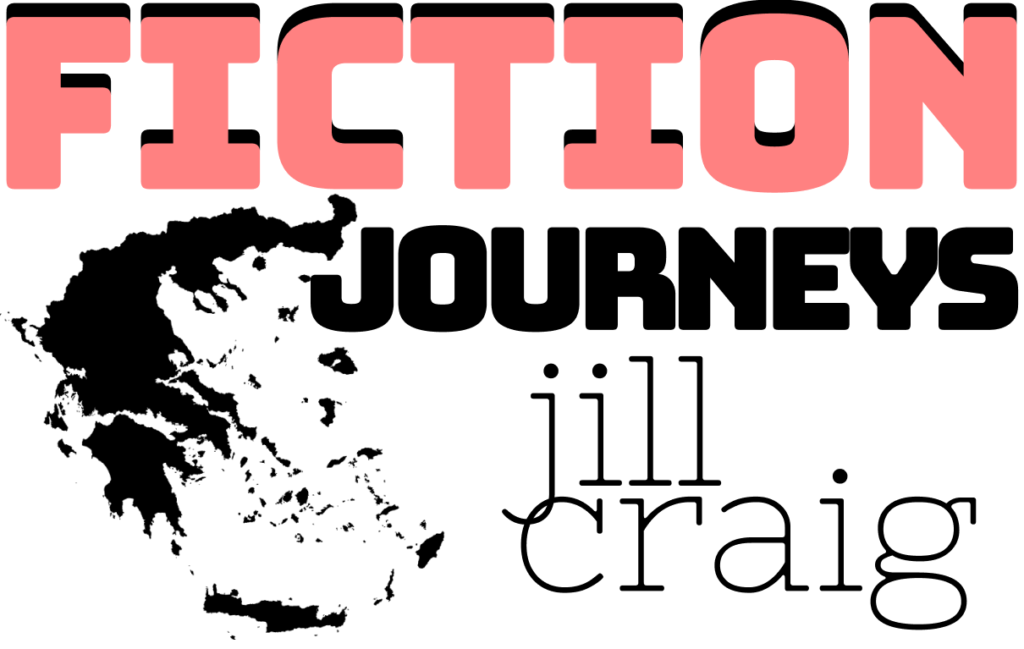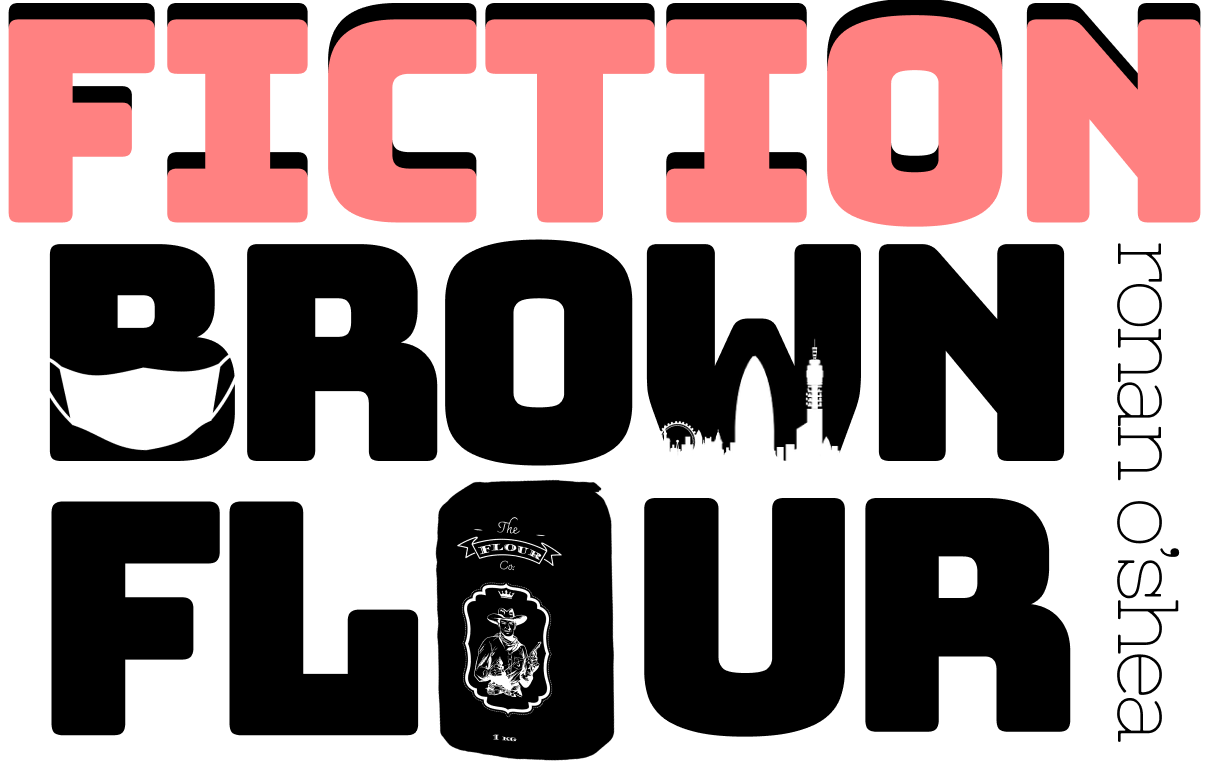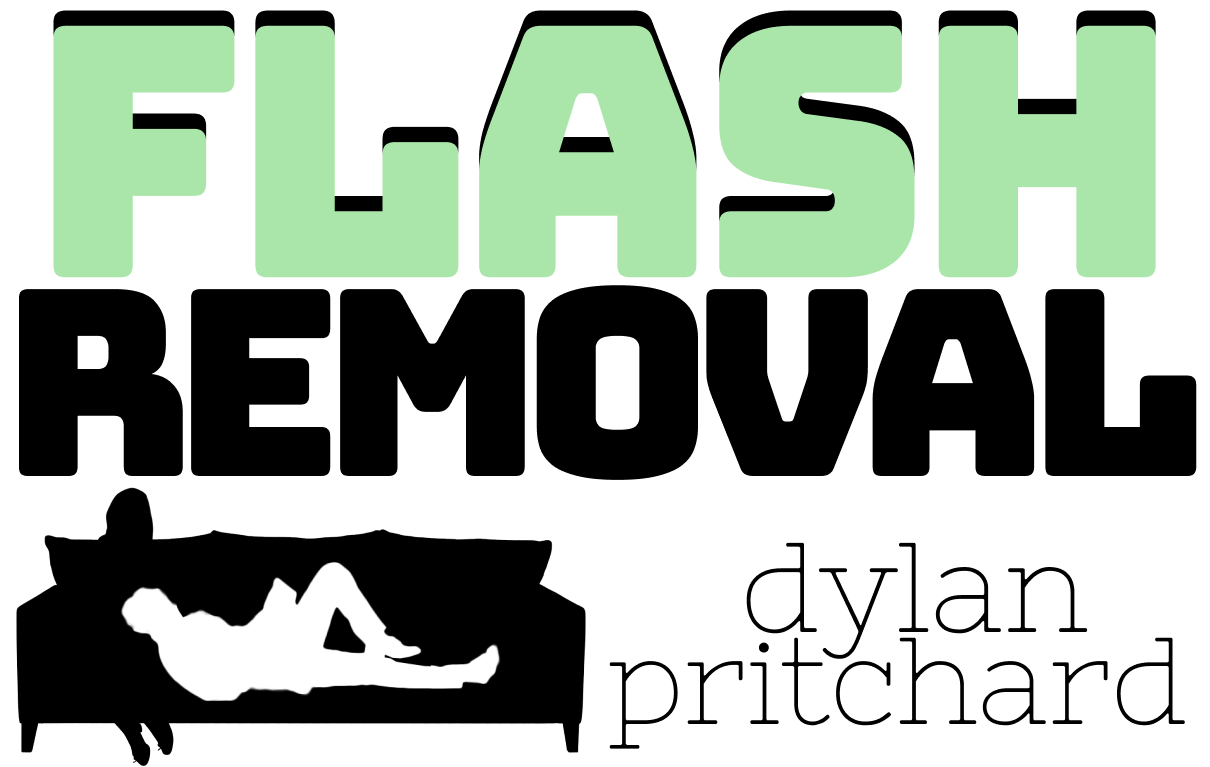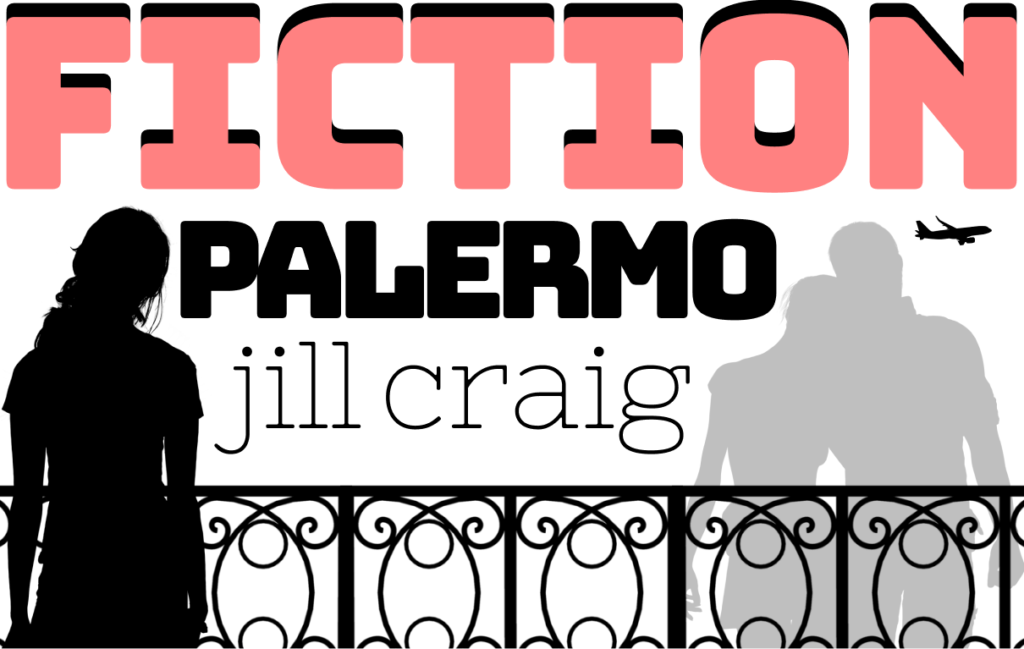
Palermo
The summer months are coming to an end and the town is emptying. Students go inland to the city; tourists return home; the doors of the many second homes are locked. In the calm harbour, the ferry has docked and buoys pock the surface of the water, bobbing lightly.
Eliza and Alex go for dinner. They have just come back from a few days in the South and Eliza feels clearer and lighter. It did us so much good, she said to him on the drive back. Thank you.
That evening, as they walk, hand in hand, they can see the small island on the horizon: an immovable certainty they have grown up seeing from different angles their whole lives. Gulls call and they nod hello to people they pass.
Are you ever jealous? she asks. The waitress sets a pizza with salami, drizzled with hot honey, between them.
Of what? he asks, as he places a small plate before her.
Of people going back to the city – you know. And that we stay here.
He lifts a piece and pulls at the tendrils of cheese. No, he says thoughtfully. I like our lives here. Even if it’s quiet. You know that. And look, even when we walked here tonight, I was thinking, there’s the bus stop where I spent every morning for years of my life waiting. There’s that corner shop where we paid lads in the year above to buy us bottles of Glen’s. And then there’s the wall behind the youth club, where, if you remember, you and I–
She kicks him lightly under the table. I remember, she says and laughs. A glass of wine later, she holds the glass to her cheek and shields her mouth. Care for a reenactment later?
After they have drunk many glasses of wine – too many – they message their friends, Tora and Jack. Come over, they say, it’s Friday! It’s 3am when they finish; the flat drained of alcohol and their energy finally spent from the dancing the four have done, raucous and joyful around a Formica table.
Jack sways lightly. Come on you, he says to Tora, gathering his jacket. Time for bed.
After some pleading, Tora surrenders. At the front door, she nods at Eliza and says in the voice of an early-hours sage: Tomorrow, your Venus will be in Jupiter. Do wash yourself. Do heal the body with crisp sandwiches. Do trim your toenails on his side of the bed.
Eliza is laughing. You are ridiculous, she says, hugging her friend. Can Venus be in Jupiter?
You are Venus, Tora says, nodding her head slowly, her pupils glassy. You can do whatever you want.
What are they on about? Jack says to Alex, who laughs with affection. Alex has opened two last beers and now passes them to Jack. For the road, he says. When his hands are empty, he puts his left hand, ringed, onto Eliza’s neck and squeezes the space between her neck and shoulder gently. It is this space, and the touch of warm lips at the curve of her collarbone, that always undoes her.
The following September, Jack stands in the doorway as Tora packs. A blue bikini, long dresses, a light trench coat. Are you excited? he says. The baby is on his hip and gurgles, fascinated.
Of course, she replies, with her back to him.
He frowns slightly at their daughter Evie, catching her eyes, impossibly large in such a small face. Evie lifts her tiny hands, flailing at something invisible to him. Jack has been with Tora for fifteen years. He does not need to see her face to know when there is more to what she says.
You’ll have fun, he says. She’s your best friend.
Yes, Tora says tiredly, taking the suitcase from under the bed. Don’t you think I know that?
I’m so glad we’re doing this, Tora says, and her mouth catches in a smile.
It is the first day of their holiday. They settled on Palermo. Both wanted the sun: arancini in sun-drenched squares, affogato in caffes, dancing on cobbled streets when people spilled out of tiny bars. In the evening, the rooms are full of yellow light. Eliza and Tora will sleep in twin beds, in a tiled room with an iron-wrought balcony and linen sheets in the colour of a milky coffee.
They have chosen their AirBnb well, and outside seems to be a focal point. People gather and sit on garden furniture which emerges from nowhere, seemingly with the lazy flick of a hand: cheap white plastic chairs and tables pushed together in random formations, with smoke drifting overhead. They go to an opening in the walls and order sandwiches from the cool dark spaces beyond: chickpea patties with feta and mint leaves on thick ciabatta, drizzled with lemon. There is caponata in sandwiches, so rich and red that it is nearly sensual.
All of this plants a seed of a different life within Eliza, and she contemplates this quietly as they eat, masking their tiredness from the early flight behind dark sunglasses. They will use this day to wander and get their bearings. They drink fresh lemonade and talk about what has happened. Eliza smokes and her voice is tight. Tora angles her chair slightly away. They go through the details again, beat by beat. Eliza begins.
When he told me, his face was tight with guilt. It tensed him, and his shoulders were all… stiff. Awkward. And he was pale, so pale, you know? Drained of colour.
Never had much colour to begin with, Tora says, nodding gravely. True complexion of the Irish. Lately, she has tried interjecting gently. It seems to be working.
No, Eliza says, with a wry raise of her eyebrows before continuing. He kept moving around the room, and I pulled at his hands –said sit down, why are you lurking like that? – and then he was standing over me, all ominous. She gestures. He was like a crow. She had tried to kiss him minutes before, to slide her hands around his waist, to whisper her tongue over his naval and use it to lift the fabric of his t-shirt – and he had stepped back, out of her grasp.
I screamed at him, she says with simplicity. She thinks of that moment, and the memory makes her shudder. Get out, she had whispered. Then when he hadn’t replied, she said it louder, made suddenly vitriolic and launching the words at him, wishing she was launching more. Get out!
Tora is quiet now, listening to Eliza speak, picturing the scene. She feels a sudden, sheer gratitude towards Jack. In the moments where she is rubbed raw with tiredness, held together only by her skin and others’ expectations, he has juggled it all. She lets her friend speak. There is a need for this anger to be exhumed, here on these light-filled streets.
What should I have done? Eliza asks, rubbing her face with her right hand. Tora opens her mouth to speak. Shuts it again.
Eliza closes her eyes. The skin near her eyes and mouth seems thinner now, like crepe paper. With her eyes still closed, she says, Perhaps his sun was in Jupiter. A red fox passed his way. All was aligned against us.
Tora warms to the theme. The only way to avoid chaos was a mud-wrestling match.
Eliza opens her eyes and laughs throatily. Oh God, remember that one!
When Alex left Eliza three months ago, the dynamic that had held the four of them together, constellation-like, exploded. A supernova.
Tora has heard it a dozen times. Eliza was looking in the cupboards, balanced on her tip-toes, pushing aside pasta – Orzo? Or pearl barley? What do you think? – and when she had turned, his face had been the colour of a sunless sky. He guided her to the kitchen table and pulled out two chairs. He had taken her hand and cleared his throat with a strange cough and her questions – the mundane, the everyday – had died in her throat. His face othered.
Fight or flight, her mind had whispered: What will it be? When the door closed behind him, Eliza climbed into bed, intent on holding herself intact where he had tried to shatter her.
For him, the decision was pre-made; no discussion needed. He packed his bags quickly – in the weeks and months to come, she would go to look for a cashmere jumper, a charger, a certain book, and find them gone, as though they had never existed – but he had left her his parting words, which were few. Her name is Sophie. A few months. Pregnant. I don’t know what to say.
It is hard to exist in the present right now. Even here, with the person she loves best, it is hard to stop the pulse of memories: the constant cinema reel of them. She thinks of a day the previous year, and in her mind’s eye, she relives it, again and again. They drove over the deep purple hills of the west coast, on a track which cut like a black eel through the countryside: Enough, he had said. We need this. For he wanted to take her mind off the blood which had come again, again, and her childless stomach. But even then, she thinks now, when he had so anchored her. Even then, when they had slept entangled and facing one another, breathing the breath of the other.
She looks now at Tora, who is spreading a map of Palermo on the table in front of them and circling different destinations. The Norman Palace? she says. Didn’t you say you wanted to go there? Apparently there’s live music. That could be cool.
But Eliza is lost in thought, combing through memories for clues. She sits back in her chair, watching the interplay of people as they sit in this weather-beaten square; the spires of the church stark against an azure sky. She is trying, trying to locate a moment where a splinter wedged its way into the grooves of their relationship. She has to understand.
There were hundreds, then thousands of days together. Headphones shared, listening to Arab Strap and Moby and The National in bed; summer picnics and autumn leaves and blue and grey and purple skies; dividing almond croissants and drinking black coffees and nursing hangovers in The Owl cafe; swimming in navy bays and black rivers that caught your breath with the cold. After-sun and paracetamol and pregnancy tests. And yet her mind returns to some moments in particular, worrying over them, gnawing at them. Again, again, again.
As she thinks, she watches the square in front of them, bordered by buildings in sand and peach tones. A blond child with a bowl cut, dressed in a red t-shirt and denim shorts, pushes a yellow lorry across the cobbles. He sits on his haunches and pushes with insistent hands, then gets up and uses the base of his little palm to lever it from the gap between the cobbles where it has become stuck. A group of elderly men with balding heads and weathered faces watch him indulgently. Bambino, she hears. The note of affection, universal to all. She watches their faces: how the lines increase and their features soften. Bambino.
On their second morning, they wake up more refreshed, hearing the sounds of water sloshing on the street outside and someone singing in Italian. They go to a cafe nearby and it is like the sleep was too good, too seductive, as though they could fall back into it, making them both hazy and slow.
Tora rings Jack and Eliza closes her eyes. She can feel the sun’s insistent rays, and when she opens her eyes, a waiter stands before her. Jeans, a white, rumpled shirt, leather shoes, skin like the texture of a wizened apple from the endless sun that touches this island. Coffee, he seems to be asking her, and Yes, she says, Please. Espresso. Tora shakes her head.
When he leaves, she looks to Tora again. Sorry, she says. I’m not being very good company. I know I need to stop dwelling on it. She laughs then, a broken laugh. Though easier said than done.
I think, Tora says, that you need to let yourself go through this. That we can talk about it as much or as little as you want.
Thank you, Eliza says. I never said thank you, to you, did I? For getting me through this.
Tora shakes her head. Stop. We don’t thank each other for this. Come on.
But yes, in those awful first days, Tora had been there, though her breasts ached with the need to feed Evie, and she was raw with tiredness. On the third day, Tora got into bed beside her and clasped their bodies together. Jeans against bare legs; Tora’s forearm in the dip of her waist; lips mouthing words of comfort into the nest of her hair. You are stronger than this. Come on.
They breathed quietly together. In, out, in, out. And, Tora said, her voice becoming gravelled and mock-serious: You are a Leo. You are the mightiest of fighters.
She remembers it now: how she had started to smile. The joke is old: a comfort blanket between them. Tora sensed the smile and continued, though she could have fallen asleep there and then, easily. Today, you should look for soap. Do: cleanse the soul and spirit, but most importantly, the underarms. Don’t: avoid toothbrushes, which are your spirit animal. Let them guide you.
The women had begun to laugh together, quietly, their sides gently juddering. Alright, Eliza said, your point has been made.
The waiter sets Eliza’s coffee down on the hot metal table and she drains it quickly, then starts to look in her jacket, her purse, her pockets for euros. Come on, she says. Let’s go for a walk. We need to wake up a bit.
They walk the light-filled streets, passing women with cropped hair and dark glasses, their husbands following in a pair behind them. They speak politely about small things: a woman’s dress; how the limited spectrum of colours here makes them feel like they are in a Wes Anderson film; whether they should get ice cream. It was not always like this.
Months ago, topics were infinite. Inexhaustible. And yet recently, something has rived between them; a fissure has opened. Eliza wants to touch Tora’s forearm, looping her fingers and thumb around it and say: I’m sorry, can we go back, can it be how it was? But she can’t. She lets Tora walk slightly ahead, pausing at a shuttered shop where sandals can still be seen through the triangulated grates.
When Alex first left, Tora came every day, but she couldn’t keep this up: not with a new baby and her job and Jack. It was too much.
Still, Tora was insistent. She told Eliza to be strict with herself and to get up at a certain time and make coffee. (The tone! Eliza remembers now. She could imagine Tora at work then, how such directness and forcefulness of instruction would be useful for a social worker.) And Eliza had followed instructions obediently. At her laptop, she sat composedly, researching policy, and joining online meetings. Sometimes, she pulled long, dark hairs from her eyebrows, wincing a little in the moment where the follicle relinquished its grip.
Some evenings, the silence became too relentless, and she filled her eyebrows back in, released her hair and went to the pub, where she drank glasses of wine slowly, looking into the faces of men who travelled through. There were often Americans on business trips, who came up to the coast, and they told her excitedly of their Irish roots. And men who worked on the boardwalk, planned to climb the inclines of the mountain. She nodded and listened, and they took this as encouragement. Sometimes, she brought them back to the bare walls of her flat and opened more wine.
One morning, Tora had texted her. Ooh! She said. Star Shine tells me you are a social butterfly. Going on dates?
The app they have used for years, screenshotting the most ridiculous of suggestions made to them, allows them to link their profiles. Tora’s mother was solemn in her reading of what was ahead, gravely intoning their months ahead when she dropped them to school. Once, when Tora was suspended for smoking, her mother had nodded, unsurprised. What that school doesn’t understand, she had said loftily, is that you, my love, are an Aquarius. It’s not within your nature to conform. The girls had looked at each other in the back seat, laughter beginning to split their expressions of contrition.
When she hadn’t replied, Tora had messaged again. Star Shine says to avoid wardrobe mishaps and old milk. Also, tell me the goss. Let me live through you.
Eliza didn’t reply. She wanted to say: Let me live through you.
After the siesta, when the shops roll their shutters back up, Tora says, Come on, I want a souvenir. I deserve something! They pick up objects wrought in glass and cool swathes of linen, both specialties of the island. They buy dresses they will only be able to wear here, and the linen is hand-made with a flowered pattern at its base. We’ll match, Tora says, and laughs. She is trying. Remember how we used to match? Grungy jeans and then skinny ones! Heels we couldn’t walk in – remember what your dad would say – and then Nikes! She strikes a pose and sings, and Eliza laughs.
An older woman presides over her tiny shop, knitting with an inscrutable expression. They buy the dresses in different shades and cuts. Tora’s joins behind her neck in a loose knot, leaving her back bare. The winged bones of her shoulder blades move as she gets ready that evening, insisting on photos on the terrace. For your mum, she says. Go on.
Eliza’s dress sits above her breasts in a circular line around her. Her blond hair is in a coloured hairband, pulled into a bun like a tulip, and her freckles are beginning to emerge. Tora takes photos of her with her Nikon, snapping quickly. For months, they have been in heavy jumpers and thick trousers and leggings, and Eliza’s body, newly taut, is a revelation to her.
They stand on the balcony, swathed in their new dresses. There is new gold jewellery on Tora’s ears and she seems to glow. Their balcony looks down on a lower terrace, and they watch an old Italian man smoke in timeless jeans and a black jumper, and a woman pinning laundry onto a line methodically. They seem to grumble to each other, and the woman slaps the man’s balding head lightly, a joking tsk.
Thank you, Eliza says quietly. For coming with me. For sorting this. What would I do without you?
Hey! Tora replies. Don’t be daft – and stop thanking me! She looks at Eliza in seriousness. You’re always my favourite person to go on holiday with. Remember Portugal, with Jess and Annie?
Eliza nudges her slightly with her right elbow. How could I forget? Though I think Jess got – and saw – enough of us to last them a lifetime.
Tora feigns looking affronted. They should have been honoured.
I will pass it onto them. Should I run into them. Promise.
They stand quietly for a few minutes. Now, what should we do tonight? Pizza, pasta, calzone… all of the above? Sangria? Oh no, that’s Spanish… What’s the Italian equivalent? She snaps her fingers suddenly in delight. Aperol Spritz! The dream.
Tora turns to look at her. Ummm, she says. Pizza, definitely.
Eliza is watching the pink sky, streaked with the brilliance of tangerine. The terrace below has fallen into shadows and the older man has gone inside. His newspaper remains on the tabletop, neatly folded. She thinks of them having dinner inside: the quietness of a shared meal, and folded laundry in the corner.
Tora pauses. I’m pregnant, again, she says, and there are tears in her eyes. I’m sorry.
Eliza is suddenly intensely, overwhelmingly aware of her own breathing. The pulse of blood in her neck. The positioning of her body against the balcony edge. A page of the newspaper lifts ever so slightly in a breeze; a red Kia starts on the street. She watches all with detachment. Swallows. The movement of her throat is painful.
Eliza turns to her and takes her hands tightly. Tora has long, elegant fingers, tapering off into strong nails. You cannot, she says, cannot apologise. Her eyes are spiking and she blinks quickly, as fast as she can. She laughs and then speaks with urgency.
I am so very, very happy for you. And for Jack, and for Evie. I promise, I am.
I just wish – and Tora’s voice falters. I wish it was different. That it hadn’t gone this way.
But it has. And this news – this is amazing. Eliza is laughing, and now her face is wet with tears. Amazing, so amazing, she says, her voice high.
God, she says. I guess the baby is due around the same time as Alex’s. They might even be in the same year at school.
Tora doesn’t say anything, and Eliza takes in her profile. Aquiline, newly tanned. This is Tora, whose face she has loved for even longer than she loved Alex’s, whose face is emerging in that of her daughter. Sometimes, when Eliza holds this tiny child, when no-one is speaking, she imagines the child is hers, that she is a body of her body, flesh of her flesh. She lingers in this imagining, this desire, for a long moment, and imagines that Alex is behind her, and that they are about to get into the car and drive through purple hills to the south. Now, she turns to her friend and her mouth is a smile.
Can I drink in celebration of you? she says, and laughs. The sky glows behind her and the city murmurs. Her throat thirsts for the tang of gin and the freshness of tonic. She gets up, her smile intact.
Of course, Tora says. Go for it. Please. She sits on the balcony alone, listening to the quick steps of bare feet across the tiled floor, then the mixing of a drink. She watches the sun sink. There is a pocket of fear growing within her: a gnawing worry about her body and her energy and her career and the many, many sleepless nights ahead, and the lack of money and arguments – of Jack saying, You said one box of nappies, definitely; and her saying, Why, why would I tell you to only get one, think about it, just bloody think about it, do I have to do everything – and the mess of the house.
When Eliza comes back, she sets her drink in front of her. Tora can smell the lime, which bobs lightly in the fizzing drink. She has only brought one drink out.
So tell me everything, Eliza says. How far along are you? You must be so excited! She sips her drink, using both hands to hold it to her mouth. So excited, she repeats. Evie’s going to have a sister! Or a brother?
Yes – well, we don’t know. Not yet.
Do you have a feeling? Like last time? And her eyes are wolfish now. She turns her head quickly. The words spill out of her. God, there’s not going to be much between them, is there?
I know, she said. It just happened. We weren’t expecting it. And she wants to take the words back.
Eliza blinks quickly. She pushes her finger into her glass, pressing down on the sliver of lime. It is submerged, pressed into the base of the glass, its flesh torn. So, that means the baby will be born in… April? May?
March. Tora says, I’m nearly three months along.
Oh! Eliza says. I don’t know how I didn’t guess.
Tora shrugs. Her smile is a fraction.
Could be a Pisces. Maybe better, so you don’t clash. Eliza is speaking musingly, stirring her drink with the tip of her little finger.
Tora thinks: when did the new jokes stop? When did they stutter and falter to this; to pulling at the reins of old jokes, whipping them to standing? She shakes herself. Smiles. Yes, she says, pretending to calculate. Maybe.
In the evening, they eat dinner at a restaurant nearby. The pasta is disappointing; too oily, and the waiter speaks with lecherous eyes as he hovers over their table. Eliza begins reading things on her phone, seemingly engrossed, and Tora takes her book out. When the shadows fall, Tora touches her lightly on the shoulder. I’ll see you back in the apartment, she says. Eliza nods, barely looking up.
That night, Tora sleeps heavily, free from the noise of a child or a man snoring beside her. Free too, briefly, from her breasts swelling with milk, though this is coming. Perhaps her body is bracing itself for the task ahead – and even back in Ireland, it seems to know that Evie will be placed hastily back in her arms and Jack will be small-eyed with exhaustion – and so it knows to sleep.
When she wakes up, Eliza’s bed is empty and neatly made. Her sandals and bag are gone but her book is there, still on the bedside table with a page neatly folded down. Tora knows her clothes well enough to know what is gone: a red wraparound dress with short sleeves. A ring she wears always, a wavy silver band, is on the bathroom shelf and Tora fiddles with it, thinking.
She moves restlessly round the flat. She doesn’t know whether to leave and so paws at the remainders in the fridge, eating squares of dark chocolate and small oranges until her hands are sticky. She leaves the peelings on the counter. Picking up Eliza’s book, she brings it out to the balcony, still dressed in her pajamas. The square is quiet and there is the gentle sound of people working and talking in Italian. The lack of rush – of frenzy and stress – is so pleasing to her that it makes her ache. She uses the time to ring Jack on video call and wave to Evie, who bounces delightedly on her father’s hip before dissolving into sulky tears. Behind them, the blue kitchen cabinets and stacked sink are just about decipherable.
In the early afternoon, Eliza returns. Her face has caught the sun and again, Tora notices how the dress gapes slightly at her newly yogic chest. Her breasts seem deflated, subdued into her newly toned body.
Sorry, Eliza says breathlessly, I should have left a note. I hope you weren’t worried.
Tora waves her hand. Don’t worry, she says languidly, I was more than happy to read your book on the balcony. Hope you don’t mind. Where did you go?
Oh, Eliza says casually, just about. She moves through the apartment, picking up a pair of square gold earrings and dotting them onto her ears. Have you eaten? she calls from the bathroom. Should we go downstairs for a sandwich again?
Sure, Tora says cautiously. Let me get dressed.
Downstairs, people have begun to cluster at tables, playing cards and swapping news. The women stand quietly together surveying the options in chalk.
It’s warmer today, Tora says. Don’t you think?
What? Eliza says absently, watching the men play. Oh, maybe.
The tables are full and so they wander quietly to the water’s edge where the wind is higher. With their wrapped sandwiches in their hands, they perch on one of the grassy ledges, watching windsurfers trace paths across the water’s surface.
Are you feeling OK, today? Eliza asks solicitously. No morning sickness?
Nothing like that. Tora shakes her head. I’m lucky this time.
Eliza doesn’t say anything and takes a bite.
It’s good, isn’t it? Tora says. You’ve always loved aubergine. At least, since we discovered it when we went to that gig in Dublin. We thought we were so sophisticated.
Eliza gives a hollow laugh. I remember. Anything but.
You called in sick – we missed the train home because we went to that party, remember?
Eliza groans. I had that terrible job at The Viewpoint then. Dogsbody.
Ah, Tora says. To have so few responsibilities. It is my personal belief that we should have called in sick more.
They eat quickly. Tora was hungrier than she realised, and Eliza offers her the last third of her sandwich (No really, I can’t. All done.), and perhaps the baby is making Tora ravenous because she is greedy for it, eagerly licking sauce from her fingers. She can feel Eliza’s eyes on her.
Is it good to get away? Tora asks when she’s done.
Eliza is silent for a moment. It is. Of course. They watch as a windsurfer lifts momentarily, the material of the wing a neon pink and sheer white in the sun. She shades her eyes with her bare hand as she watches them before speaking. It all feels like a dream, here.
Tora is folding up the paper and foil from her sandwich. That’s the thing about holidays – it’s hard to go back to reality.
Mmm, Eliza says. What she meant though, was that the last few months in Ireland now seem like a distant dream. And the distance is a balm. Tora moves to get up.
I’ve been thinking, Eliza continues hesitantly. That I might stay. At least for a little while.
Tora turns to look at her. She inhales quickly and one hand lifts unconsciously to the soft swell of her stomach. Stay? What do you mean? We have our flight home.
I’ll miss it. Or come back. Why not? Eliza says. I can work where I want. There’s nothing to pull me home, not right now. Her smile is brittle. The world is my oyster. There is a gap between her words and Tora nearly speaks– And it’s beautiful here. So beautiful. I could do some classes – there’s a yoga studio, and English classes, near the piazza. I checked this morning. She lets the words hang in the air. I could work in the mornings, learn some Italian. Just be. Until I catch my bearings. At least. She lifts her shoulders slightly, and when she releases them they are freer and looser. Who knows what could happen?
But what about your flat? Your things?
I can buy new things. Or bring them here. Please. I haven’t figured it out yet. But I can’t – I can’t be there, not when the baby comes.
They are speaking not of Tora’s baby here, not Evie or the baby who will follow, but Alex’s. The one he will have in the months to come, whose hair will be as deep a red as that of the woman he is now with. Sophie.
Tora can’t imagine it. For a moment, she shuts her eyes. I can’t leave you alone.
There is the softest of silences, in which Eliza considers the seed that this island has planted. She thinks of waking in rooms the colour of a cappuccino, of drinking coffee on shaded balconies as the sun rises over rooftops, of swimming in the sea and letting herself float. She wants to pick up fresh fruit and vegetables at markets, to test their weight and firmness, to let her eye judge by colour and smell. To learn to barter in Italian. Of small moments of progress. She thinks too of letting herself exist in a quietness. But Toor, Eliza says quietly. Toor, my love. That’s the thing – can’t you see? She takes Tora’s hands between hers and squeezes them gently. I already am.
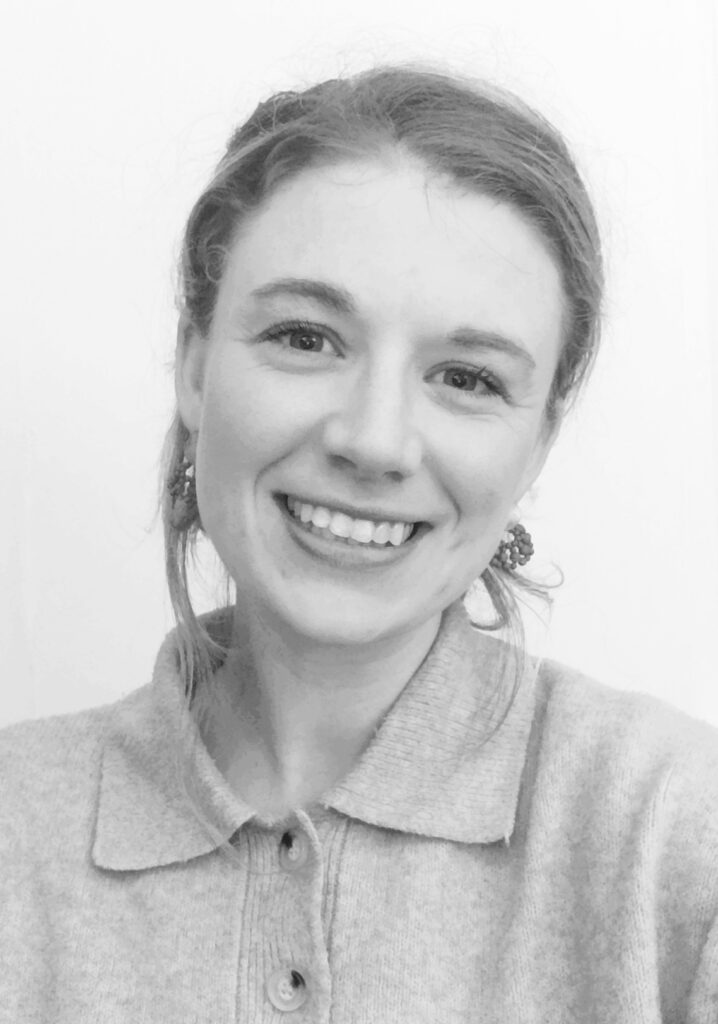
Jill Craig
Jill Craig grew up in Northern Ireland, studied in Glasgow, and lived in France and Greece before moving to teach in the North-West of England.
She is a current student of The Novel Studio and has previously had an article published in Freckle about the culture of food in a Greek refugee camp. Another story will shortly be published with Literally Stories.
